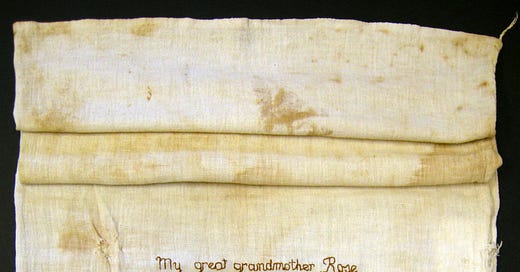Photo Courtesy Middleton Place, CC BY-SA 4.0
I’m reading an excellent new book, and I think that you should read it too. All That She Carried, by Harvard professor and historian Tiya Miles, traces the history of Ashley’s sack, a large cotton bag that was embroidered with its story by a woman named Ruth Middleton in 1921. Ruth’s mother, Ashley, was enslaved, and when she was nine years old her mother, Rose, gave her the bag with a few precious items in anticipation that she would be sold and they would be separated. Dr. Miles traces the journey of the three women through the cotton sack, which she described in a recent Zoom reading as large enough to serve as a blanket, or a kind of shelter. It is such a powerful artifact, Miles writes, that Middleton Place, which is its custodian, used to station someone with tissues near its display.
It’s hard to convey the experience of reading this book, which is unlike any history I’ve read, and which I am still reading, and will probably reread once I’m done. Miles considers the sack from many angles—the story of its cotton, the story of the years before slavery was abolished, when even more families were separated, their children sold. The story of foodways, textiles, craft, and women’s material culture as historic evidence. The story of the Great Migration. But she begins the book by writing about love, which is the largest word embroidered on the bag:
By loving, Rose refused to accept the tenets of her time: that people could be treated as property, that wealth was a greater value than honor, that some lives had no worth beyond capital and gain. Here is just one telling example of refusal from the collective experience of enslaved Black women, who practiced love and preserved life when all hope seemed lost.
Imani Perry says that Miles is “a gentle genius” (she is a recipient of a MacArthur Genius Grant), and I think that’s a beautiful description of what it is like to hear her talk about her research and read from her book. She is soft-spoken, warm, and forceful all at once. I listened to her talk by myself the other night, after dinner, but I think Bea could have attended (she actually met Dr. Miles when she was very little, at an Orion conference). Near the end of the talk, Dr. Miles told us, “We are all living in someone else’s past.” Such a powerful thing to ponder that someone copied it into the chat.
In any case, take advantage of these possibly-waning days of being able to hear incredible readings and talks over Zoom! Dr. Miles’s next public reading is June 22; you can get free tickets here, and please consider inviting your children if you feel they are old enough. Certainly a middle or high school student could understand and be moved by the story of Ashley’s sack, which follows the best teaching practice: start with something small and tangible, go deep, and from there you can understand the biggest things.
Ashley’s sack is on display at the National Museum of African American History and Culture in Washington, DC. I hope we have a chance to get there this summer, and I hope you’ll read this beautiful, important book, which would make an excellent Father’s Day gift.
Here is an excerpt of All That She Carried.
Are you reading anything great right now? Please tell us:
We cheered when we heard that Louise Erdrich won the Pulitzer this year (for The Night Watchman)—Bea is a huge fan of the Birchbark House series, which we’ve mentioned here before, and last year I had an Erdrich summer, reading a lot of her newer work, including The Night Watchman, which was fantastic. (Big cheers to Percival Everett for Telephone, a finalist, too.)
P.S. I know I promised to round up some favorite art supplies—I will do that this coming week, stay tuned!




I can never resist making book recommendations and so here are two. An academic book that also introduces memoir and experiments with form (and is moving and wrenching and inspiring at once): Christina Sharpe's In the Wake. And a historical novel that I'm only a third of the way through but is really great thus far: Maggie O'Farrell's Hamnet and Judith.
Hurrah for Tiya!